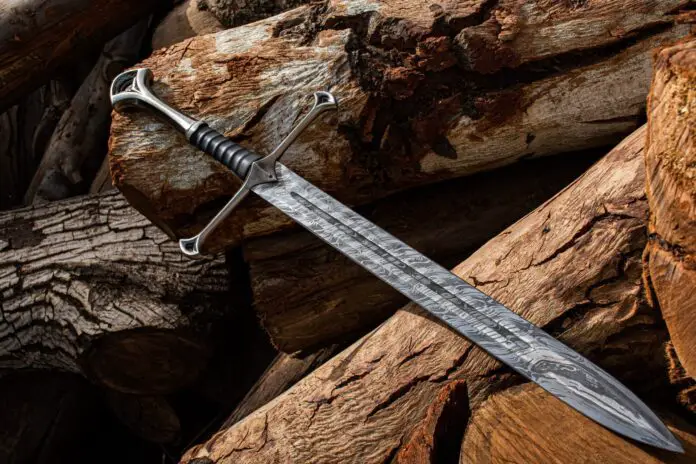A Damascus Sword is any sword forged by Damascus Steel, high-grade steel made from Indian wootz steel using an ancient technology that was lost to history. Their surfaces might have vibrant whirling patterns. Damascus Steel, like Japanese folded steel, is the subject of numerous imaginative quality exaggerations, with swords claiming to be able to cut neatly through falling silk and cleave rocks in half.

The origin of the steel for the sword.
The term “Damascus Steel” has a hazy history. Two Islamic philosophers named Al-Kindi and Al-Biruni (approximately 800-873 CE) wrote about swords and the steels used to make them, describing them according to their look, the place where they were made or forged, or the name of the blacksmith. Additionally, both scholars cite “damscene” or “damascus” in parts of their descriptions of the swords.
How is Damascus steel made?
Since this process and expertise were lost in the 1700s, anyone who says their knives are made of Damascus steel does not refer to the original way they used to make them.
This steel was initially created by casting wootz, a type of steel first made in India more than 2000 years ago. In the third and fourth centuries, the city of Damascus, now known as modern-day Syria, saw a rise in the use of weapons and other objects fashioned of wootz.
Although several efforts have been made to reverse engineer the method for producing Damascus steel, no one has been able to cast an equivalent material.
Cast wootz steel was created by melting iron and steel with charcoal in an oxygen-free environment. Following the metal’s carbon absorption from charcoal, the alloy underwent a lengthy cooling process that produced a crystalline substance containing carbide.
Damascus steel is made by forging wootz into swords and other weaponry. However, this procedure was only available to the elite because it took great ability to maintain steady temperatures to manufacture steel with the iconic signature wavy pattern.
Why choose Damascus steel for swords?
Many producers choose between 2-5 alloys that work well together and create a beautiful pattern as a vital component in the process. Once the knife has been forged and ground to shape, the waves of steel meet at the edge, and you can change the blade’s performance by adjusting the alloy and heat treatment process.
If you want to acquire a high-quality Damascus steel sword, do your research and approach it as an investment.
Damascus steel is distinguished by its extraordinary hardness and a wet, streaked look created by the original material’s fluctuating carbon levels. Sometimes a single bar is welded together from different types of steel. Next, the bar is doubled over, welded, redoubled, and rewelded until the various layers of steel entangle, which is worked out to form the blade.
The patterns created due to quenching and polishing are distinct and complicated. Damascus swords are primarily appraised by their wetness, which indicates the steel’s quality.
Conclusion
Finally, most of today’s highly exotic alloys outperform any pattern-welded steel. Therefore, having and using a Damascus steel blade is more about personal taste and respect for the time and effort it takes to create such a blade.
A well-made Damascus sword will hold its sharpness for longer than most production-quality blades, although the highest-performing blade steel may be found elsewhere.
Quality is mainly influenced by price. Damascus steel from a reputable manufacturer is of the finest quality. Knives manufactured from these steels are exceptional.
Unfortunately, low-cost knockoffs from China, Pakistan, and India flood the market, frequently appearing on eBay and other online merchants. Avoid them because they are trash; as the saying goes, if the price is too reasonable to be true, it probably is.












































